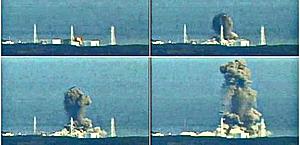Nuclear Fission - Disadvantages
Safety
In theory nuclear power should be safe if it is managed carefully and properly. But if things go badly wrong, this can result in enormous environmental and health damage. Such accidents have happened in practice, despite claims that nuclear fission power is safe.
Find out what happened when nuclear accidents occured.

Sabotage
Another safety related concern is the risk of sabotage or terrorist attack at a nuclear plant.
 This report from Greenpeace cites a document claiming that new designs for French nuclear power stations are vulnerable to terrorist attack. Note, Greenpeace is a pressure group that has campaigned against nuclear power for many years. Does that affect the validity of what it has to say?
This report from Greenpeace cites a document claiming that new designs for French nuclear power stations are vulnerable to terrorist attack. Note, Greenpeace is a pressure group that has campaigned against nuclear power for many years. Does that affect the validity of what it has to say?

There have been dangerous accidents at nuclear power stations, but does that mean that all nuclear power is always unsafe? As Georges Monbiot argued in July 2011:
 The best evidence for the safety and resilience of nuclear power plants can be found at Fukushima. Not at Fukushima Daiichi, the power station where the meltdowns and explosions took place, but at Fukushima Daini, the plant next door... ...It was hit by the same earthquake and the same tsunami. But it survived. Like every other nuclear plant struck by the wave, it went into automatic cold shutdown. With the exception of a nuclear missile attack, it withstood the sternest of all possible tests.
The best evidence for the safety and resilience of nuclear power plants can be found at Fukushima. Not at Fukushima Daiichi, the power station where the meltdowns and explosions took place, but at Fukushima Daini, the plant next door... ...It was hit by the same earthquake and the same tsunami. But it survived. Like every other nuclear plant struck by the wave, it went into automatic cold shutdown. With the exception of a nuclear missile attack, it withstood the sternest of all possible tests.
What we see here is the difference between 1970s and 1980s safety features. The first Daiichi reactor was licensed in 1971. The first Daini reactor was licensed in 1982. Today's technologies are safer still. The pebble bed reactors now being tested by China, for example, shut themselves down if they begin to overheat as an inherent property of the physics they exploit. Using a plant built 40 years ago to argue against 21st-century power stations is like using the Hindenburg disaster to contend that modern air travel is unsafe.
Source

 Nuclear waste
Nuclear waste




 Chernobyl
Chernobyl Three Mile Island
Three Mile Island This report from Greenpeace
This report from Greenpeace Nuclear waste
Nuclear waste
What's your opinion?
Average rating




Not yet rated